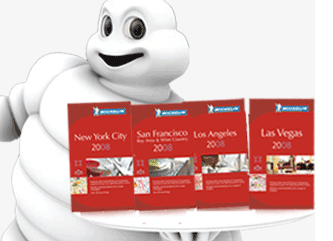
Michelin mascot Bibendum with American editions of the guide
In the beginning, they were address books for local garages, designed for chauffeurs who needed a lube job or a tire change. In fact, the books were given away free by the Michelin tire company. The hotel and restaurant listings came later, but soon took over the company.
Nowadays, Michelin ratings for restaurants (technically, they're rosettes or medallions, not stars), have become sought-after beyond all reason. Bernard Loiseau, the chef in Burgundy, mortaged his entire life to upgrade his roadside inn, La Côte d'Or in Saulieu from two- to three-star status; a few years later, he committed suicide on rumors that he would be downgraded again. Unlike the Zagat guides, which at least acknolwedges that they're based on reader surveys, Michelin speaks with an oracular voice, unfathomable and infallble.
Quelle merde, according to several top French chefs. According to press reports this week, the country's fourth three-star chef has now withdrawn. Olivier Roellinger joins Joel Robuchon, Alain Senderens and Antoine Westerman in turning returning the stars and closing their award-winning restaurants. (Westerman turned his place, Buerehiesel, over to his son.) They're getting the best of everything. On the one hand, these culinary artists retired at the peak of their powers, so they don't have to face a future of disappointed diners. And with the other hand, they're delivering a slap at Michelin for its often arbitrary and capricioius ratings.
Ironically, Loiseau's widow took the reins after her husband's death, winning back three-star status for the inn, now defiantly renamed Bernard-Loiseau.
Leave a comment